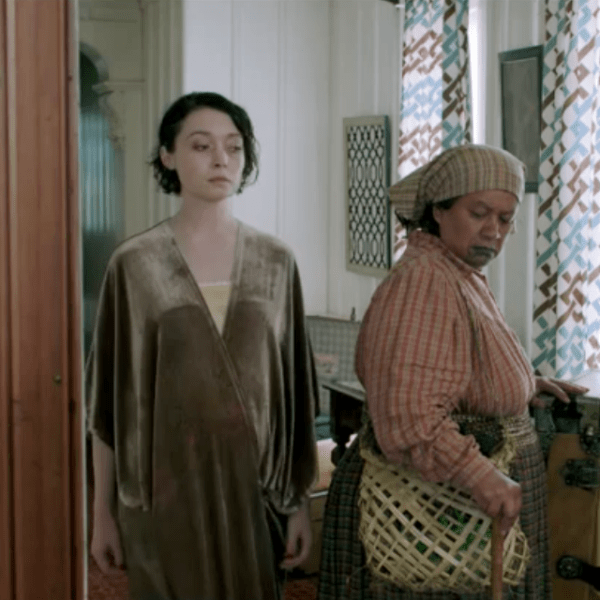
Were you looking for a film about the conflict between New Zealand’s native Māori people and white colonialists in the 1920s through a deeply female point of view? Well, White Lies (2013) is the film you want, and it’s a meditative, powerful, thoughtful look at what different women go through under the constraints of racism, class, and sexism.
I actually don’t want to say much about the plot because I went in knowing not much, and I felt that the story unfolded beautifully and was completely engaging as-is. There’s a pregnancy / birth, but it’s probably less graphic than Call the Midwife in that respect, while entirely different in tone. White Lies is currently available for streaming on Amazon Prime and Kanopy, but as always, check your own sources.
The story is set in the 1920s, and while there’s no title card stating the date, the period is introduced obliquely through things like showing Charlie Chaplin posters at a movie theater in the background and, of course, the costumes. See? When the exact date isn’t important, you don’t have to title-card it.
The costumes are minimal and reflect each character’s circumstances. Paraiti (Whirimako Black) is a medicine woman, but she has to work stealthily because the Tohunga Suppression Act of 1907 outlawed traditional Māori healing practices. Her clothes are practical and dark, she blends in to her surroundings in the wild villages, though she stands out in town. She carries a woven basket and wears a belt made of natural materials.
In contrast is Maraea (Rachel House), who is also Māori and around the same age as Paraiti, but Maraea lives in town and works as a housekeeper. She’s fastidiously buttoned up in a dark grey uniform with crisp white collar, cuffs, and gloves.
Finally, there’s Rebecca (Antonia Prebble), who employs Maraea. Rebecca lives in a big house with her Very Important Husband who’s away on Very Important Business. The house has perfectly Art Deco furnishings, and Rebecca’s hair, makeup, and wardrobe are all fashionably 1920s, although nothing too fancy for reasons that will become apparent.




At the end of the film, Rebecca has one fancy dress for an important scene.


Will you be looking for White Lies?













I’ll but this on my watchlist.
Of course.
This looks so interesting. Adding to my watchlist now! Thanks for bringing it to our attention.
I’ve seen it and can echo the recommendation.
I watched it last night. The film was excellent but I guessed what Rebecca’s secret was before it was revealed. But I still give it *****. The bigotry against the Maori was horrendous and reminded me of the plight of the Australian Aborigines.
Hello! Just wanted to let you know that ‘Australian Aborigines’ is an outdated term. While of course individuals have their own preferences, it’s generally recommended that ‘Aboriginal and Torres Strait Islander peoples’ or ‘First Peoples’ is used. More information here if you’re curious: http://www.narragunnawali.org.au/about/terminology-guide
I saw this film a few years back and it struck me as an important and deeply disturbing take on race, but not from a North American perspective. The costumes and sets set the tone, The house and wardrobe seemed fashionable, but also slightly muted in their color tones for most of the film, as if to emphasize the lack of warmth in the home. Thanks for reminding me of how good it was.
I’d also recommend RABBIT PROOF FENCE for more on historic race relations in Australia/New Zealand.
Australia and New Zealand are completely separate countries therefore have entirely separate histories around race relations, since their respective colonial relationships were with the indigenous Aboriginal people in Australia and Polynesian settlers (Maori) in New Zealand. Please don’t talk about them as one country, it’s offensive.
Oh my goodness! I watched this not long after reading this post, and I can def see why you couldn’t say much about the plot without giving the entire story away. Powerful, so powerful.
Interesting intersection of religion and racism.
And…considering what’s big in the news right now, brings up some fascinating questions about consent and bodily autonomy.